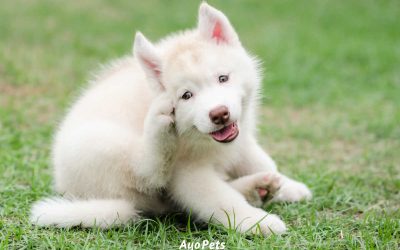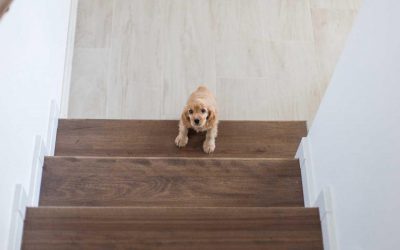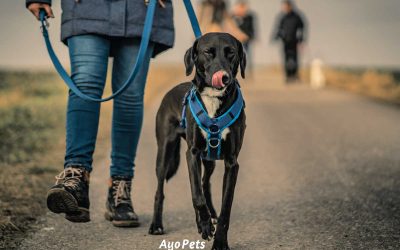If you have a puppy in your life, you may also have bite marks on your arms and legs. Puppies are sweet, lovable, and adorable, but they’re also biters. Many new pet owners wonder why their puppies are so keen on biting, whether it’s normal behavior, and if they’ll ever stop.
Puppies grow out of biting on their own, usually by the seven-month mark when their adult teeth have grown in. They normally bite when they’re teething or playing. Puppies may also chew and nibble on things as part of normal puppy behavior when they’re bored, frustrated, afraid, or overexcited.
In this article, I’ll share when puppies usually start and stop biting, the 6 most common reasons why puppies bite, and how to teach puppies to stop biting. I’ll also cover some signs of abnormal or aggressive puppy biting, and give you tips on how to soothe a teething puppy and keep your pup from biting things around your home.
When puppies start and stop biting
Puppies and dogs can bite at any age.
Puppies as young as six weeks old are known for nipping and mouthing, but this is usually more like gnawing than proper biting. Two months old is when puppies usually start biting for real.
Puppies usually start teething at around three months of age, and most puppies have a complete set of adult teeth by the time they’re seven months old.
The time between two to seven months is when most puppy biting happens. It’s also the period when you need to work on teaching your puppy how hard to bite and when not to bite.
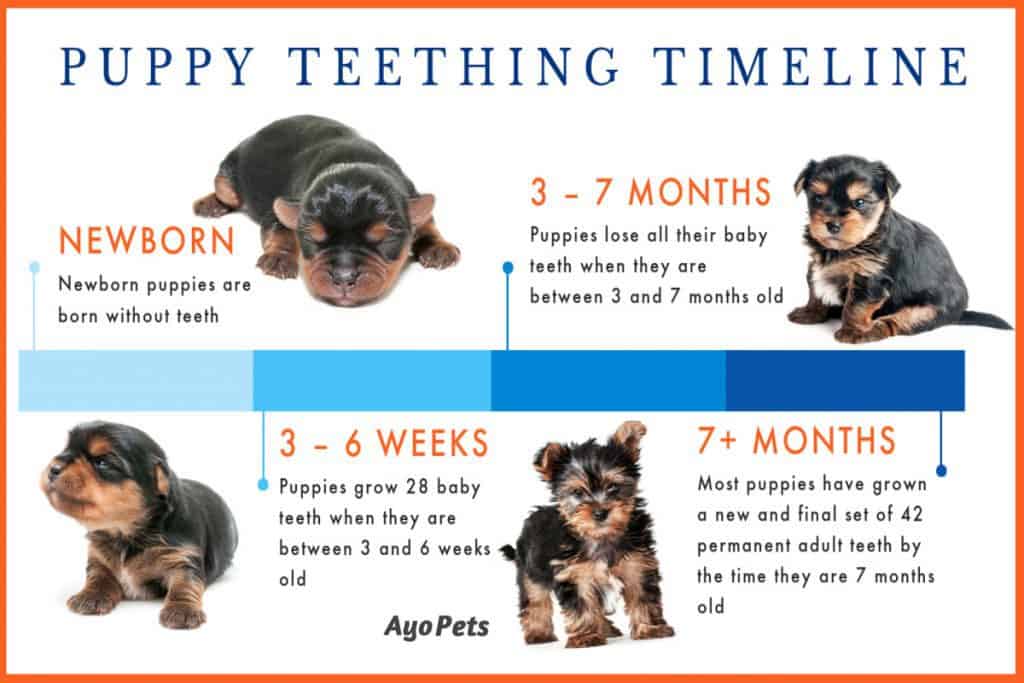
This doesn’t mean a puppy won’t bite after seven months of age. Some puppies, especially bigger breeds, take longer to mature and grow out of puppy biting than others.
And if you don’t teach your puppy not to bite, your puppy-turned-adult dog could go on biting forever, even with full-grown adult teeth (ouch!).
Why puppies bite
There are all kinds of reasons why puppies bite, nip, and chew on things. Some of these reasons are innocent, ‘puppies-just-being-puppies’ reasons. Others are more serious and need attention.
Let’s cover a few of the most common causes of puppy biting.
Puppies often bite because…
They want to play
Puppies bite because they’re puppies – they’re learning to play and socialize.
When left with their littermates, puppies scrabble all over each other, bite each other’s ears, and paw at one another. When another puppy cries, bites back, or mommy tells a puppy off, the puppy learns what behavior is acceptable and what isn’t.
When you bring a puppy home, you become their new ‘littermate,’ and all the playing they do happens with you.
Biting comes naturally to puppies, and they have no idea they aren’t supposed to do it until taught otherwise. That’s why it’s your job to teach them not to bite or to bite using only gentle pressure.
They’re teething
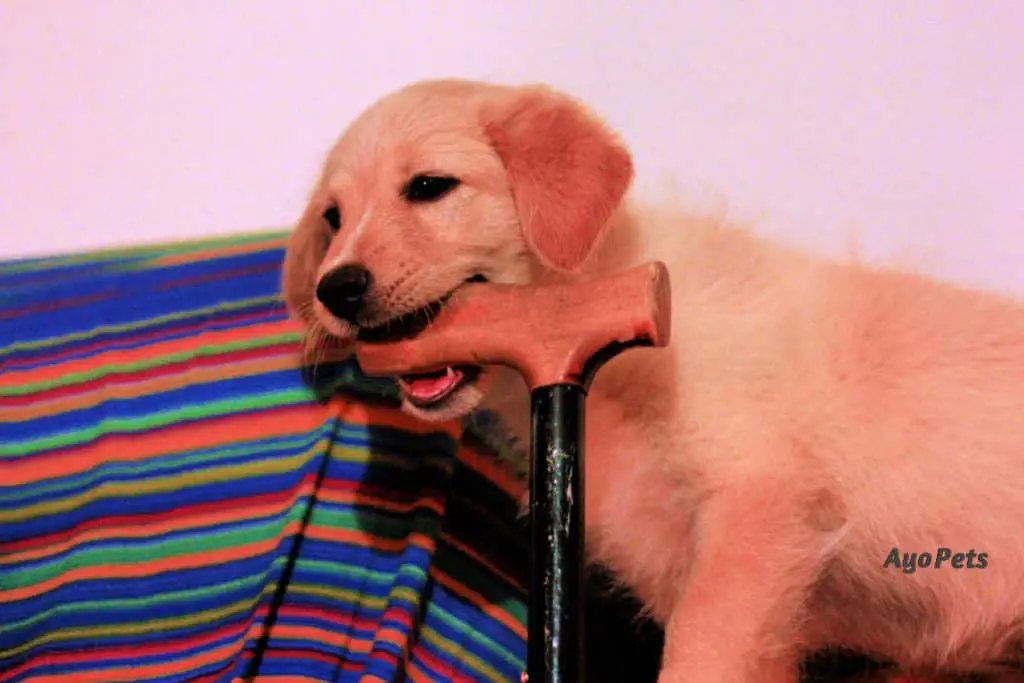
Puppies teethe just like human babies, and their mouths tend to hurt when this happens. Puppies will do just about anything to try to soothe their aching gums and help the new teeth break through, which is why your puppy chews on things like your furniture or favorite pair of shoes.
If a puppy is constantly gnawing on you and puppy toys instead of sharply biting, it’s probably because they’re teething and this is normal. If your pup often swallows things that aren’t food, your pup could have a condition called pica.
They’re bored
When puppies don’t have enough mental stimulation, exercise, attention, or playtime, they often get bored or stressed and become destructive. If you’ve ever seen a photo of a young dog standing in the middle of a destroyed room, it was probably taken after the puppy was left alone for some time.
Dogs are pack animals and live in groups in the wild. So dogs, especially young ones, like the safety and security they get from being with others. Being left alone, especially for a long period of time, is very stressful for them.
If your puppy spends a lot of time alone, crated, or entertaining themselves, you’re very likely to see biting and chewing issues.
They’re scared, frustrated, or hurt
If your puppy isn’t prone to gnawing on you but suddenly bites you with the intent to hurt you, there’s probably a more direct cause for this behavior. Either something (or someone) has scared the pup, the puppy is tired, or they’re frustrated or in pain.
If you woke up a sleeping puppy (and puppies sure do need a lot of sleep) suddenly with a fright, the dog’s natural instinct is to see you as a potential threat and bite.
If a puppy meets a new person, the puppy could be spooked and bite.
If a puppy’s given you signs that they want to be left alone and for you to stop petting them but you don’t stop, the puppy can become frustrated and nip.
Finally, if your puppy is sick or in pain, biting is a natural response. Puppies cannot tell you that there’s something wrong or where they’re hurting. If your puppy is sick, has pain in a certain area, or if you hurt the pup – even accidentally – your puppy may snap at you when you touch the painful area or when the dog sees you as a threat.
They’re overexcited
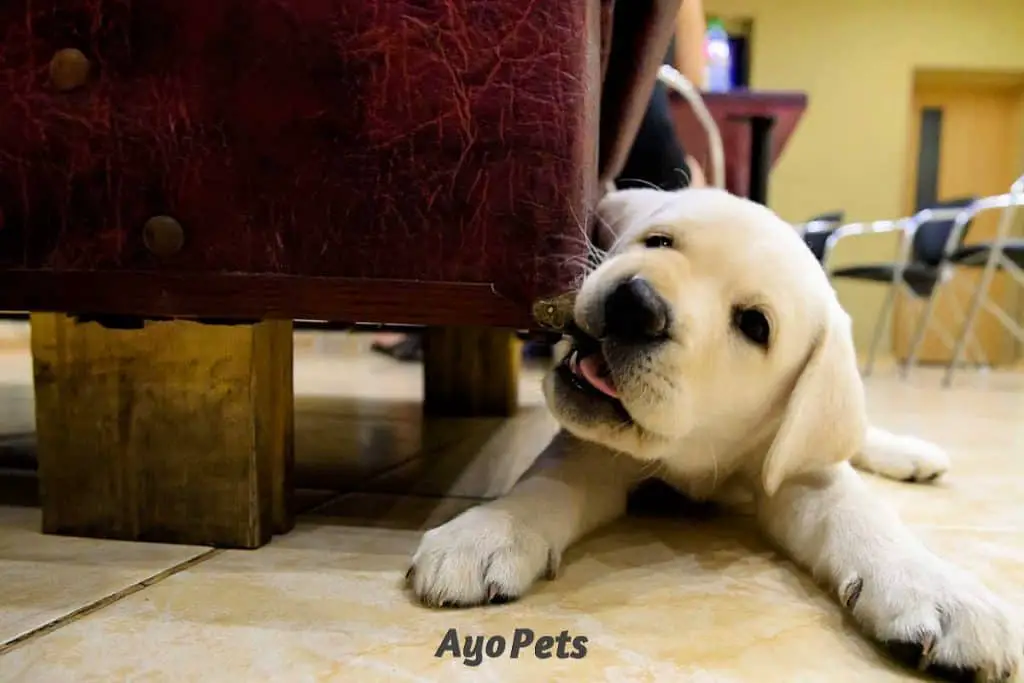
Overexcited puppies behave in all kinds of unpredictable ways. If your puppy gets too excited about something, their most common response will probably be to pee on the spot as they wiggle their bum.
Another typical response to overexcitement is biting.
This is highly likely if you’re in the middle of playing a fun, overstimulating game with your puppy. The puppy gets caught up in the moment, forgets themselves, and bites you. This isn’t meant to hurt you: your pup’s just super pumped, and since puppies can’t speak to tell you about it, they nip you as part of the game instead.
They’re tired or need to potty
Puppies sometimes give a little bite to communicate with people, especially if their humans don’t understand what they’re asking for. These are less common reasons for biting, but occasionally puppies will give a little nip or gentle bite to let you know they’re tired, need to potty, or ask for help with something.
For example, if your puppy’s tired and you keep trying to play with them, the pup may give you a little bite as a way to get you to stop.
How to help a teething puppy
There are three things you can do to help a teething puppy:
- Feed your puppy frozen foods (such as this dog-friendly bone broth from Amazon, or these dog-friendly fruits or vegetables)
- Buy your puppy chewing and teething toys made for pups
- Freeze a wet washrag, and let your puppy chew on that
Frozen items all work similarly – the cold helps numb your puppy’s mouth, and can soothe a puppy’s aching gums.
Puppy toys are designed with teething puppies in mind, so they’re literally made for the job. Giving your puppy something to sink their teeth into can relieve any frustration that your pup might be feeling and help the new teeth break through the gums sooner.
You don’t want to give your pup anything that can be broken into small pieces and swallowed, as this could be a choking hazard. I prefer tried and tested brands, like this popular teething chew toy on Amazon.
As a side note… Don’t leave your puppy alone with things you don’t want to be destroyed. You can always put your pup behind a baby gate if you can’t keep an eye on them for a while. This protects your home and it protects your puppy from getting hurt or sick from chewing or swallowing things.
If puppy is chewing on your leather couch, click here for easy ways to protect your furniture.
Signs that puppy biting is a problem
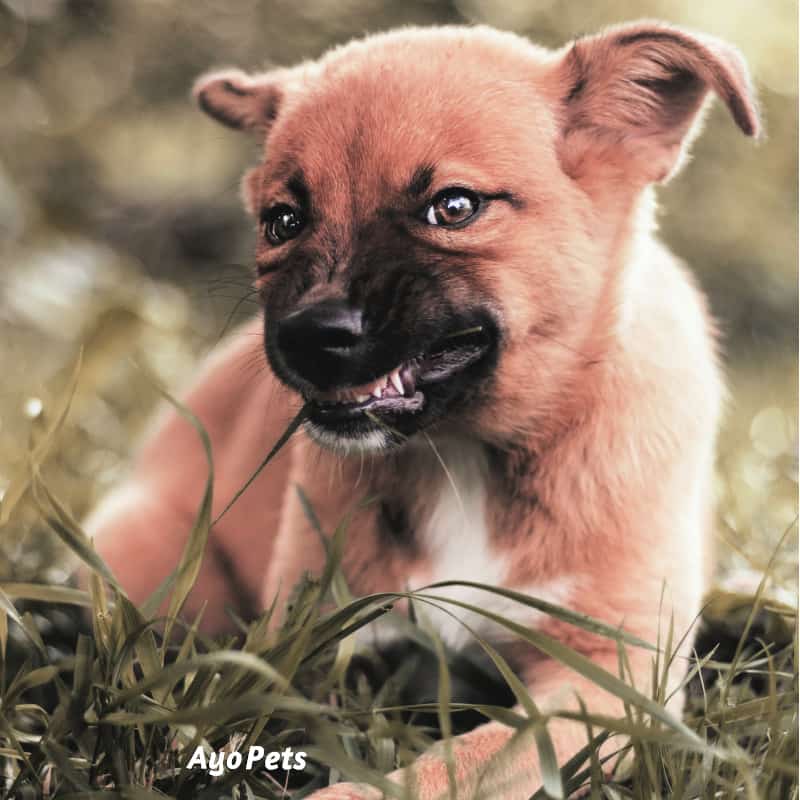
The best way to know if your puppy’s biting is aggressive or problematic instead of ‘normal’ is to watch the dog’s body language.
If the biting comes with loves, snuggles, cuddles, and during playtime, it’s probably harmless, even though it may hurt. This is normal and you can simply teach your pup not to bite or how hard is too hard.
But if your puppy’s biting comes with raised fur on the back or angry growls, you may be looking at problematic behavior. Here are some of the most obvious signs that your puppy’s biting may be cause for concern:
- Growling
- Raised fur
- Snarling
- Lunging
- Repeated sharp, painful bites (nipping) as opposed to constant gnawing or chewing
- Aggressive barking
- Lip curling
- Eye-to-eye deadlock staring
- Food or toy aggression
If you notice any of these behaviors in your puppy, get advice from a trainer, a canine behaviorist, or your veterinarian to correct the behavior as soon as possible.
How to teach a puppy to stop biting
As long as your puppy’s biting isn’t due to aggressive or problematic behavior, getting a puppy to stop biting isn’t that hard.
First establish the root cause of the biting. If it’s boredom or teething, the solutions are simple: Give your puppy plenty of toys and things to chew to ease the teething pain, and make sure your pup gets plenty of exercise and attention to avoid boredom.
Take sick puppies to the vet. If biting is a side effect of pain or sickness, it should stop once the puppy is well again.
Watch your pet’s body language. If your puppy’s tired or agitated, don’t keep trying to force attention on them. You don’t want to be touched and moved around when you’re not feeling well, so it makes sense to respect a dog’s space as you would another person’s.
Final thoughts
All puppies bite. It comes with the territory and can be managed with the right tools and understanding.
When your puppy starts biting, firmly tell the dog no, and give them something else to play with or chew. Teaching your puppy about bite pressure is also crucial. If you don’t mind your dog nibbling when playing, then teach your dog to bite gently.
Biting is a normal stage of puppy development. It’s usually nothing to be concerned about, but it can’t be left unchecked either. With a little attention and training, your puppy will grow into a happy, healthy dog.
It takes some work, but it’s worth it in the end.




